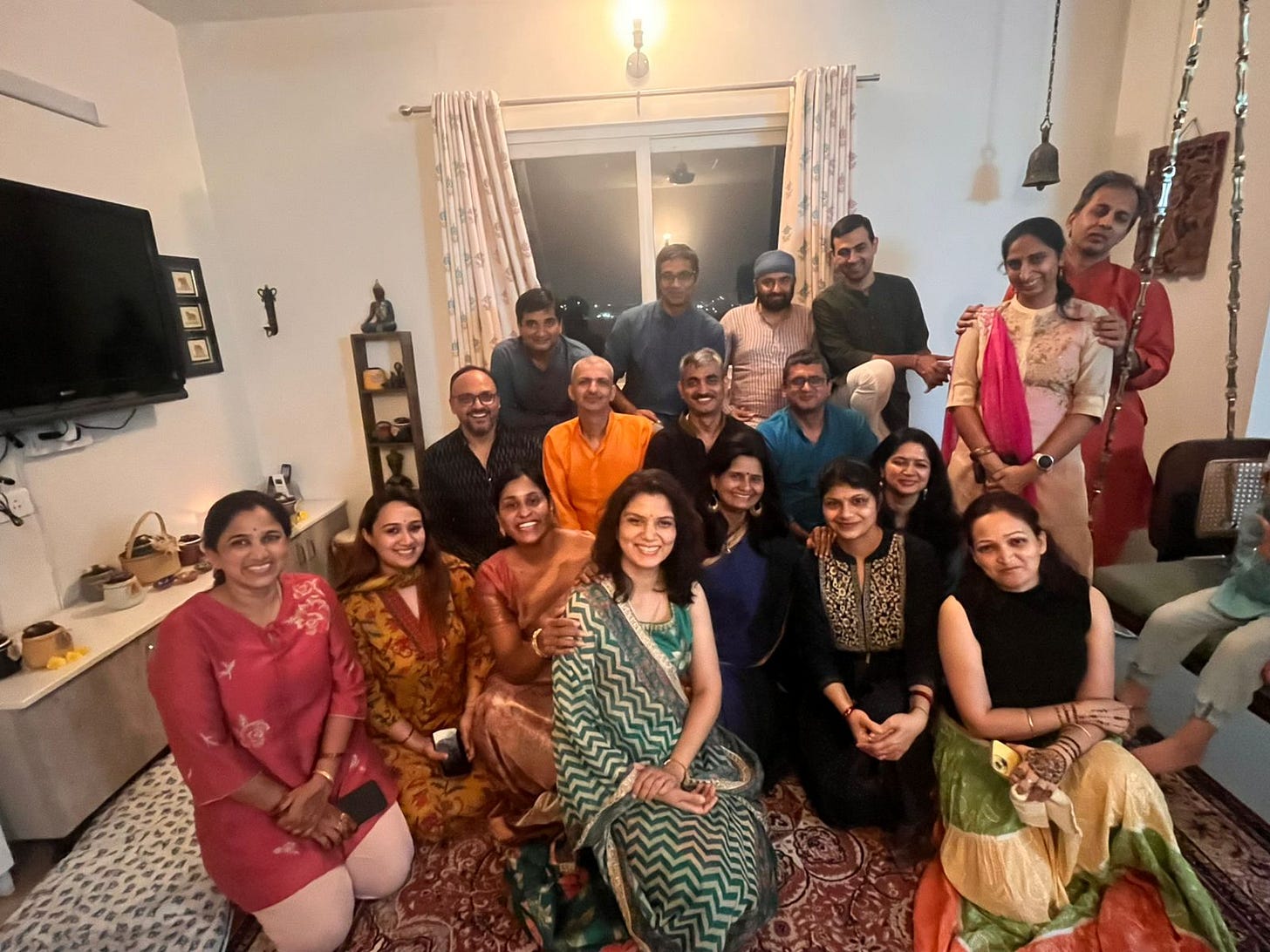An incredible experience to brainstorm with GWC Data.AI leadership team ! The energy and enthusiasm from the team were palpable as we worked together to develop a powerful MVP for their upcoming AI-driven platform. It was truly inspiring to see the focus, innovation, and commitment from everyone involved.
Huge thanks to the brilliant co-founders led by Naveen Kumar and a special shout-out to Mamtha Shanmugam —a proud alumna of IBS Hyderabad, MBA 2020 batch—for the kind invitation and who also brought her unique insights and energy into the mix. Exciting times ahead for the GWC team! Best wishes for the journey forward!
DTW
During the Week, SpaceX achieved a remarkable milestone, showcasing its Super Heavy booster’s ability to be captured mid-descent by mechanical arms, marking a leap in rocket reusability. The spectacle highlighted the future of travel beyond Earth, with rapid reusability playing a critical role. As we look forward, such advancements in technology not only redefine space travel but also hold transformative potential for industries like aviation and tourism.
Even when we have started contemplating about space tourism, we can already see sea-changes in the tourism on terra firma. And I believe that Platforms and digital technologies will be central in optimizing these innovations, ensuring seamless integration and unlocking new possibilities for exploration and global travel experiences. The world has changed drastically since the onset of the COVID-19 pandemic. As travel and tourism were among the hardest-hit industries, they now stand at the cusp of transformation. The future of travel will be shaped by new demands, fresh perspectives, and evolving technologies. Digital platforms, already integral to our lives, will play a crucial role in facilitating this transformation, helping to address emerging traveler needs, reshaping the industry, and ensuring sustainable and safe experiences.
There were unverified reports about Uber's potential bid for Expedia which highlighted the growing role of platforms in transforming travel and tourism. This strategic move underscores Uber's ambitions to become a “super app,” providing everything from ride-hailing to booking flights and hotels, much like how SpaceX is revolutionizing space exploration. Both stories illustrate the increasing influence of platforms in various industries, where digital innovation enables companies to expand into new sectors. As platforms evolve, their ability to connect and integrate services, from space travel to tourism, signals a future where platforms dominate every aspect of our lives, including how we explore the world.
In this issue, I reflect on my own experiences as a trekker/traveler, the evolving travel trends, and how digital platforms will power the future of travel by making it Private, Proximate, and Personalized while also addressing concerns around hygiene, convenience, and care. I will also explore the broader theme of slowing down and deliberate living, which is fast becoming the new travel trend.
When I embark on my annual trek in the Garhwal Himalayas every year, I feel more connected to nature than ever before. Unlike the bustling city life with its constant connectivity, the serene alpine meadows of Uttarakhand allow me to disconnect from technology and reconnect with myself. Ironically, despite being a lover of the outdoors and physical adventure, I could not help but notice the fundamental shifts that have taken place in travel, leisure, and tourism over the past few years. The pandemic has catalyzed changes in how people view travel, with safety, hygiene, and health now taking center stage. The travel of tomorrow will be defined by three essential pillars—Private, Proximate, and Personalized travel experiences.
1. Private Travel Experiences: Before the pandemic, the idea of luxury travel often conjured images of opulence—five-star hotels, grand destinations, and exclusive parties. But the definition of luxury travel is shifting toward the concept of privacy and personal space. In a world where people are wary of crowded spaces and unsure of shared accommodation, privacy has become the ultimate luxury.
Platforms like Airbnb have already begun to cater to this demand by offering private stays, often in secluded, natural settings. Luxury travel is seeing an uptick as travelers are willing to pay a premium for secluded experiences where they can avoid mass tourism and maintain privacy. These trends are reflected in the choices made by ultra-runners and trekkers alike, who often opt for isolated, tranquil settings for their vacations, where they can fully immerse themselves in the beauty of nature while avoiding the crowds.
My recent experience in the Garhwal Himalayas reaffirmed this shift. The once-popular tourist hubs, overcrowded with trekkers, are now seeing more demand for off-the-beaten-path locations. Digital platforms are helping adventurers like me discover these hidden gems and book private and more exclusive trekking and camping experiences.
2. Proximate Travel Experiences: While global travel has not yet returned to its pre-pandemic levels, regional and domestic travel has flourished. The idea of ‘Proximate Travel’—traveling to nearby, easily accessible destinations—is rapidly gaining popularity. Digital platforms are making it easier for travelers to discover local and nearby destinations that were previously overlooked.
Apps like TripAdvisor, Google Travel, and Instagram are helping users explore lesser-known destinations close to home, promoting local tourism and eco-friendly travel. For instance, during my visit to Goa with my family, I used a friend to plan a trip exploring the sights, sounds, and scents of local Goan culture.
Similarly, in the Himalayas, locals are using platforms to promote homestays, small businesses, and bio-tourism initiatives, allowing travelers to experience proximate adventures without traveling far from home. This shift from international to local travel is creating new opportunities for smaller, rural economies to thrive.
3. Personalized Travel Experiences: The personalization of travel has become paramount. People are no longer looking for generic, one-size-fits-all trips. Instead, they seek experiences that resonate with their unique interests, whether it be food, culture, wellness, or adventure. Travel is becoming less about ‘doing’ and more about ‘experiencing,’ with a focus on mindfulness, self-discovery, and deliberate living.
Platforms such as Airbnb Experiences, Booking.com, and specialized travel apps allow travelers to craft customized experiences based on their preferences. During my treks in the Garhwal Himalayas, I have noticed a rise in demand for tailored trekking experiences, with itineraries that match specific fitness levels, preferences for scenic beauty, or spiritual significance. For instance, a trek leading to Mandani Valley and concluding at Kedarnath can be personalized to offer a mix of adventure, pilgrimage, and self-reflection. These platforms curate and match personalized experiences for users, ensuring that their journey is both meaningful and tailored to their specific needs.
Green, Blue and White Digital Detox
Thanks for your Love and Wishes. This piece has been in writing for close to a year now. A chance discussion about trekking in Garhwal Himalayas in my marketing class forced me to finish writing this travelogue.
The post- pandemic life style changes has also led to a surge in wellness tourism. Travelers are seeking more meaningful experiences, such as mindfulness retreats, spiritual getaways, and wellness programs. By collaborating with local service providers, digital platforms are able to offer a range of wellness experiences, from yoga retreats in Rishikesh to Ayurvedic healing in Kerala.
As travel becomes more private, proximate, and personalized, digital platforms are playing a crucial role in facilitating these trends. The future of travel will rely on platforms that provide hygiene assurance, convenience, and care at every step of the journey.
1. Hygiene Assurance: Platforms are increasingly emphasizing the importance of cleanliness and health safety, promoting sanitized accommodations and contactless services.
2. Convenience: Travelers expect seamless, hassle-free booking experiences, and platforms are delivering. From quick hotel bookings to local experience reservations, platforms like Booking.com, Skyscanner, and Agoda have made the process more streamlined and efficient.
3. Care: Beyond hygiene and convenience, travelers now seek experiences that cater to their mental and emotional well-being. Platforms are offering guided wellness programs, slow travel experiences, and curated retreats that focus on mindfulness and relaxation. Community-driven platforms, like the Slow Bazaar initiated by Neelesh Misra, promote slow travel, creating communities that emphasize intentional and meaningful living.
The pandemic has taught us the importance of slowing down, and this has translated into the travel sector as well. Slow travel, as a concept, is gaining traction, with travelers opting for long-term stays in remote areas, seeking deeper connections with the places they visit.
Looking ahead, digital platforms will continue to drive the future of travel, facilitating a more personalized, proximate, and private travel experience. They will connect travelers with new and remote destinations, promote eco-friendly travel, and enable more mindful, slow travel experiences. Platforms will also continue to address the demands for hygiene, convenience, and care, ensuring that travel in the post-pandemic world is safe and sustainable.
Ultimately, the future of travel is bright, and digital platforms will be the engines driving this transformation. Whether you're booking a serene trek in the Garhwal Himalayas, experiencing the cultural heritage of Goa, or planning your next ultra-marathon, platforms will be there to curate and deliver exceptional travel experiences. As we move forward, the integration of digital solutions and personal touchpoints will ensure that travel remains meaningful, enjoyable, and sustainable for everyone.
OTW
Over the Weekend, the festivities started with an early Deepawali get together with friends over some lip smacking food and interesting discussions. Thanks to Shireesha and Rajanikanth Reddy for being the gracious hosts.
Festivities continued on Sunday with Archana observing KarwaChauth fasting while Aru and I visualised an awesome dinner.



Congratulations to fellow runners who ran the Vedanta Delhi Half Marathon 2024 despite the obvious issues of over crowding, higher than usual temperatures and signature bad AQI. We also have inspirational young runners like Jason Moses who organised a campaign to raise funds and was honoured at the press conference for the VDHM event kick off for being the largest fundraiser among those under the age of 18. His contributions to raising funds for organ donation for underprivileged children through Mohan Foundation were well recognised.
MOHAN Foundation is a not-for-profit, non-governmental organization started to promote organ donation in 1997 in Chennai by philanthropists and medical professionals led by Dr. Sunil Shroff.
More power to Jason and his peers.
I Love You
Shailendra





